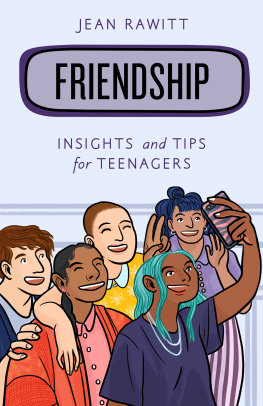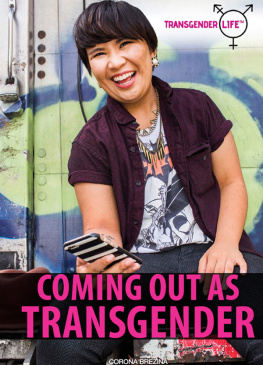Kezia Endsley is a writer and editor from Indianapolis, Indiana. In addition to editing technical publications and writing books for teens, she also enjoys running and participating in triathlons, traveling, reading, and spending time with her family and many pets. She has written more than fifteen books for the teen market, including many about finding your best career.
When all Americans are treated as equal, no matter
who they are or whom they love, we are all more free.
Barack Obama, forty-fourth president of the United States
SEEKING A BETTER UNDERSTANDING
Our culture seems to be slowly realizing that sexual preference is on a spectrum, rather than being a binary (yes or no) kind of characteristic. Teen boys find themselves wanting another man, and teen girls find themselves wanting another woman. Some teens find that they are equally attracted to men and women, or sometimes to men and other times to women. All of this is normal.
If youre wondering if youre queer, the good news is you dont have to know the answer right now. Some feelings get stronger throughout time, and some get weaker. Since no two people experience desire and love in the same way, you cant just open a textbook that will teach you exactly who you are and what to do. This chapter hopes to help you along the path of self-exploration.
THE DIFFERENCE BETWEEN GENDER IDENTITY AND SEXUAL ORIENTATION
Whereas sexual orientation is considered an inherent and (usually) enduring emotional, romantic, or sexual attraction to other people, gender identity is a persons internal concept of self as male, female, a blend of both, or neither. Its how individuals perceive themselves and what they call themselves. Your gender identity can be the same or different from your sex assigned at birth. Transgender people may be straight, lesbian, gay, or bisexual, just as cisgender people may be.
WHAT SHOULD I CALL YOU?
As a point of reference, the following tables (see , for example).
Table 1.1. Sexual Identities and Their Definitions
Identity | Definition |
gay | A person (male or female) who is emotionally, romantically, or sexually attracted to members of the same gender. Sometimes still refers to just men, as in gay men and lesbians. |
lesbian | A woman who is emotionally, romantically, or sexually attracted to other women. |
bisexual | A person emotionally, romantically, or sexually attracted to more than one sex, gender, or gender identity, although not necessarily simultaneously, in the same way or to the same degree. |
queer | A (once-derogatory) term people often use to express fluid identities and orientations. Often used interchangeably with LGBTQ. |
pansexual | Someone who has the potential for emotional, romantic, or sexual attraction to people of any gender, although not necessarily simultaneously, in the same way or to the same degree. |
asexual | Someone who experiences little to no sexual attraction. |
demisexual | Someone who generally does not experience sexual attraction unless they have formed a strong emotional connection with someone. |
graysexual | Someone who occasionally experiences sexual attraction but usually does not; it covers a kind of gray area between asexuality and sexual identity. |
Sources: Human Rights Campaign, Glossary of Terms, last modified 2020, https://www.hrc.org/resources/glossary-of-terms; Michael Gold, The ABCs of L.G.B.T.Q.I.A.+, New York Times, last modified June 7, 2019, https://www.nytimes.com/2018/06/21/style/lgbtq-gender-language.html.
Table 1.2. Gender Identities and Their Definitions
Identity | Definition |
transgender | Someone whose gender identity or expression is different from the biological sex they were assigned at birth. |
transfeminine | An umbrella term used to describe someone who was assigned male at birth and identifies with femininity. Someone who identifies as transfeminine may also identify as a trans woman or female. |
transmasculine | Someone who was assigned female at birth but identifies with masculinity. Someone who identifies as transmasculine may also identify as a trans man, trans woman, or male. |
cisgender | Someone whose gender identity matches the sex they were assigned at birth. |
genderqueer | Someone whose gender identity is outside the strict male and female binary. They may express both traditionally masculine and feminine qualities or neither. |
gender nonconforming | Someone who expresses gender outside traditional norms associated with masculinity or femininity. Not all gender-nonconforming people are transgender, and some transgender people express gender in conventionally masculine or feminine ways. |
nonbinary | Another term for someone who identifies as neither male nor female and sees themselves outside the gender binary (male and female as one of two choices only). |
gender fluid | Someone whose identity shifts or fluctuates. These individuals may identify or express themselves as more masculine on some days and more feminine on others. |
gender-neutral | Someone who prefers not to be described by a specific gender but prefers they as a singular pronoun or the Mx., a substitute for Mr. or Ms. |
intersex | Someone who is born with reproductive or sexual anatomy that doesnt fit the typical definitions of female or male. |
agender | Those who dont identify with any gender or cant relate to gender terms or labels at all. Agender people are not necessarily asexual. They can have any sexual orientation. |
Sources: Human Rights Campaign, Glossary of Terms, last modified 2020, https://www.hrc.org/resources/glossary-of-terms; Michael Gold, The ABCs of L.G.B.T.Q.I.A.+, New York Times, last modified June 7, 2019, https://www.nytimes.com/2018/06/21/style/lgbtq-gender-language.html.
You might decide that you dont exactly fit into any of these categories, and thats okay, too. The important thing right now is to relax and start telling yourself, Whatever the answer, its my business; its only part of who I am, and Im going to grow to embrace it and like it about myself.
You cant let other people determine who you are attracted toitll just add misery to your life that you dont need. Be intentional. Listen to your body, mind, and heart.
MYTHS ABOUT SEXUAL ORIENTATION
Lets start by laying to rest some common myths about sexual orientation. You may have heard others say these things, or perhaps youve thought them yourself. Its time to dash these misconceptions to the rocks.
A person is either straight or gay. When it comes to sexual orientation, many (most?) people are neither 100 percent straight nor 100 percent gay. Recent research indicates that, when given the option, many heterosexual people describe themselves as mostly straight rather than straight.
Everyone who claims to be bisexual is in denial about being gay. See the text box titled A Myth about Bisexuality in this chapter.
A bisexual person is always equally attracted to both men and women




